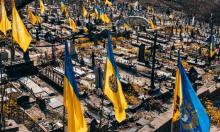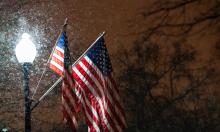Beirut: Lebanese president dismisses security fears over U.N. report on Hariri murder
Lebanon's president and its top military commander sought to reassure jittery Lebanese on Wednesday amid fears the findings of a U.N. probe into ex-Prime Minister Rafik Hariri's killing might jeopardize this country's stability.
President Emile Lahoud and Army Commander Gen. Michel Suleiman said in separate statements that Lebanon's military and security services have been mobilized to protect public safety and prevent attempts at disturbances.
Their remarks came a few days before chief U.N. investigator Detlev Mehlis submits his findings to the Security Council on Hariri's killing. Many here blame Syria for the assassination, a charge it denies. Mehlis is to deliver his report to U.N. Secretary General Kofi Annan on Friday.
Lebanon is on edge, with many people expecting Mehlis' report to implicate Syria. A series of mysterious bombings during the past eight months has killed or wounded politicians and journalists opposed to Syria and caused havoc in commercial and residential districts.
Ahead of the report's release, Lebanese troops and policemen, backed by armored personnel carriers and trucks, have been deployed at key intersections in Beirut and other major cities. Checkpoints have been set up at key crossroads with troops stopping cars and searching passengers for weapons, while ambulances and fire engines have been seen on standby.
Extra security measures have been taken around the fortified U.N. offices in downtown Beirut, with additional concrete barriers installed Wednesday. The Defense Ministry also suspended all gun licenses beginning Thursday and until further notice.
Also, the head of the U.N. Information Center in Beirut, Nejib Friji, has been temporarily withdrawn from Beirut "for his own safety," the United Nations said. Friji was very visible with the Mehlis team, arranging the investigators' encounters with the press. But Lebanese officials sought to quell rumors that a curfew may be imposed and schools closed Friday and have been trying to reassure citizens all will be normal.
Lahoud said the Middle East is passing through "delicate circumstances" and warned Lebanese to be "wary of designs aimed at causing (security) breaches to weaken the internal arena through which Lebanon's enemies can infiltrate."
He did not elaborate, but his comments came a day after Lebanese Prime Minister Fuad Saniora and Palestinian President Mahmoud Abbas met in Paris. Both leaders condemned the smuggling of arms to Palestinian militants inside Lebanon, while Saniora said Abbas protested "infiltration" of weapons through Syria. Saniora also ruled out any trouble in Lebanon as a fallout from the U.N. report, telling Al-Jazeera TV that: "I tend to believe that nothing will happen." Interior Minister Hassan Sabei said security measures, including around-the-clock patrols by troops and security forces, amounted to "an undeclared state of emergency."
Hariri's Feb. 14 assassination in a massive bomb blast in central Beirut touched off a groundswell of protest in Lebanon and internationally, forcing Syria to withdraw its troops from Lebanon and ending nearly three decades of domination of its tiny neighbor. The Mehlis team has named four Lebanese generals, all close to Syria, as suspects in the assassination. Lebanon has arrested them. Last week, one of seven Syrian officials questioned by the U.N. team, Interior Minister Ghazi Kenaan, committed suicide.
Meanwhile, the United States is consulting with other governments on possible follow-up action on the Hariri killing probe plus a report on disarming Palestinian militias in Lebanon, said America's ambassador to the U.N., John Bolton.
Bolton refused to confirm an AP report that America and France are readying new Security Council resolutions critical of Syria ahead of this week's report that is expected to show Syrian complicity in Hariri's killing, AP reports.
A.M.
Subscribe to Pravda.Ru Telegram channel, Facebook, RSS!





